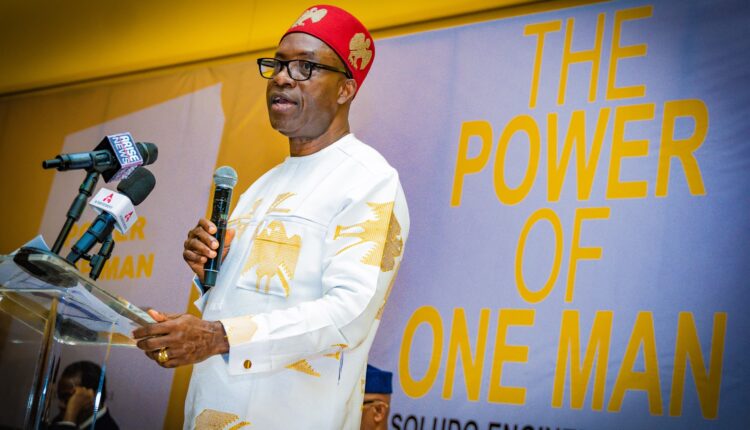SOLUDO’S MASTER CLASS IN VISIONARY LEADERSHIP: REMEMBERING ONE MAN’S LEGACY THAT RESHAPED NIGERIA’S BANKING LANDSCAPE

By Christian ABURIME
Revolutions, milestones and legacies come in diverse shapes and hues. Whatever may be the diversity or distinctiveness of paradigm-shifting events, they do remain timeless in the halls of memory, with their authors unforgotten. In Nigeria’s financial history, few moments stand out as starkly game-changing as the banking sector consolidation of 2004 through 2005. At the heart of this seismic shift stood a man whose vision, courage, and leadership would forever alter the trajectory of the nation’s economic landscape: former CBN governor and now Governor of Anambra State, Professor Chukwuma Charles Soludo, CFR.

Twenty years on, the reverberations of Soludo’s bold reforms continue to echo through Nigeria’s financial corridors. The recent launch of “The Power of One Man: How Soludo-Engineered Consolidation Transformed Nigerian Banks To Global Players” at Eko Hotel and Suites in Victoria Island, Lagos, is a poignant reminder of the profound impact one individual can have when armed with vision, determination, and the courage to challenge the status quo.
Soludo’s journey as the architect of Nigeria’s banking revolution is a master class in visionary leadership. Faced with a fragmented and unstable banking sector, he recognised the urgent need for radical change. Where others saw insurmountable challenges, Soludo envisioned opportunity – a chance to transform Nigeria’s banks from local minnows into global powerhouses.
The path to reform was fraught with obstacles. Resistance came from all quarters – entrenched interests, skeptics, and those who feared change. Yet, it was in this crucible of opposition that Soludo’s true mettle as a leader shone through. He understood that great change often demands great sacrifice, and he was prepared to pay the price.
As revealed during the book launch in Lagos on Saturday, Soludo’s approach to the consolidation process exemplified the power of teamwork in achieving monumental goals. He assembled a crack team of experts, each bringing unique insights and skills to the table. This collaborative approach was crucial in navigating the complex web of financial, legal, and political challenges that lay ahead.
The consolidation process was more than just a financial exercise; it was a test of national will and unity. Professor Soludo’s vision called for stakeholders across the spectrum – from government officials to bank executives, from regulators to everyday Nigerians – to come together in pursuit of a common goal. This ability to rally diverse groups around a shared vision is a hallmark of truly transformative leadership.
Courage, perhaps more than any other quality, defined Governor Soludo’s tenure at the helm of the Central Bank of Nigeria. In the face of threats and intense pressure, he remained steadfast in his convictions. The decision to raise the minimum capital base for banks was not just a policy shift; it was a declaration of intent, a bold statement that Nigeria was ready to play on the global stage.
The results of Soludo’s reforms speak volumes. Nigerian banks emerged from the consolidation process stronger, more stable, and better positioned to compete internationally. The transformation was not just in balance sheets and capital adequacy ratios; it was a fundamental shift in mindset. Nigerian banks were no longer content to be local players; they now had the ambition and the means to become continental and global forces.
Two decades on, as Nigeria faces new economic challenges, the lessons of Soludo’s reforms remain as relevant as ever. They serve as a powerful prompt that with visionary leadership, steadfast courage, and a commitment to teamwork, even the most daunting obstacles can be overcome.
In celebrating the launch of this book, we are not just commemorating past achievements. Thus the story of Nigeria’s banking consolidation is more than just a chapter in financial history. It is a tribute to the power of one individual to catalyze change, the importance of bold vision in driving progress, and the transformative potential of courageous leadership. As Nigeria continues to navigate the complexities of the 21st-century global economy, the example set by Professor Soludo stands as both an inspiration and a blueprint for future reforms. Nigeria can overcome its current challenges and emerge stronger, just as its banking sector did two decades ago.


